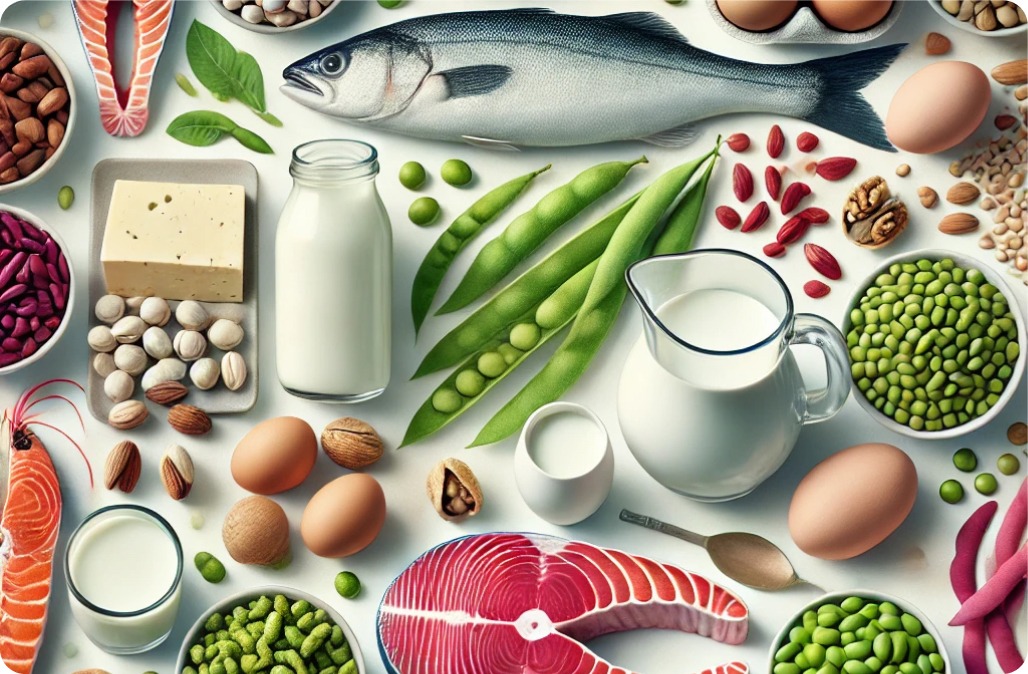Healthy Lifestyle Blog
Nutrition
💪 The Power of Protein: Optimizing Women’s Diets for Strength and Vitality
Published Date: 15 November 2024

Introduction
Protein is often associated with building muscle, but its benefits go far beyond that. As one of the body’s primary building blocks, protein plays a crucial role in maintaining health across all stages of life. For women, ensuring adequate protein intake is vital not only for physical strength but also for supporting overall metabolic health, promoting recovery, and maintaining hormonal balance. As women age, protein becomes increasingly important for maintaining muscle mass and bone strength, helping to prevent conditions like sarcopenia, a gradual loss of muscle mass that can increase the risk of falls and fractures.¹ Beyond muscle health, protein is also known for its role in promoting satiety, making it an essential part of a balanced diet for long-term wellness.
Why Protein Matters 🍗
Protein serves as the foundation for many of the body’s essential functions. It is crucial for repairing muscle tissue after physical activity, supporting immune health, and producing enzymes and hormones that regulate bodily processes. In women, particularly as they age, protein intake becomes a key factor in maintaining muscle mass and reducing the risk of sarcopenia. Incorporating enough protein can also help with weight management by increasing feelings of fullness, preventing overeating, and sustaining energy levels throughout the day. Research consistently highlights the importance of protein for maintaining strength, supporting healthy aging, and improving overall quality of life for women across all age groups.²
Optimal Protein Sources 🥚🍛
- Plant-Based Proteins: Foods like tofu, tempeh, lentils, and soybeans are excellent sources of protein, providing the added benefit of fiber for digestive health.
- Animal-Based Proteins: Fish, eggs, lean meats such as chicken and duck, and dairy (milk, cheese, and yogurt) are rich in high-quality protein and provide essential amino acids that the body cannot produce on its own. For women, especially during pregnancy and menarche when iron needs are higher, red meat like beef or lamb can be beneficial due to its high iron content, which supports energy levels and overall health.
Daily Requirements 📅
Protein needs vary depending on age, weight, activity level, and overall health.³ On average, women require 0.8g/kg of body weight of protein per day, though this increases for those who are pregnant or lactating, engaging in high-intensity physical activity, or recovering from illness or surgery. Discuss with your healthcare professional if you would like to find out more about your specific protein requirements.
Meal Planning Tips 📋
Incorporate protein into every meal to ensure you’re meeting your daily requirements. Mix and match different protein sources for increased variety.
Here are some ways to incorporate more protein into your diet:
- Eggs or scrambled tofu on toast: A quick and versatile breakfast option packed with protein, whether you choose eggs or a plant-based alternative like scrambled tofu.
- Peanut butter with apple slices: A simple, high-protein snack that also provides healthy fats and fiber from the apple.
- Hummus and veggies: Pair hummus with sliced carrots, cucumbers, or bell peppers for a quick, plant-based protein snack.
- A glass of milk/soy milk, yogurt, or a serving of cheese: Great sources of protein and calcium, essential for bone health and overall vitality.
- Edamame: Snack on steamed edamame or toss it into salads or stir-fries for a protein-packed addition.
- Handful of nuts: Almonds, cashews, or pistachios make for a quick, easy protein-rich snack that also provides healthy fats.
- Tofu soup or chicken and vegetable soup: A nourishing and filling meal rich in protein.
- Include at least one option of fish, chicken, eggs, or tofu with vegetables and brown rice when cooking or eating out: This ensures a good balance of protein, fiber, and healthy carbohydrates in your meals.
Conclusion
Prioritizing protein in your diet is essential for maintaining strength, supporting metabolic health, and ensuring vitality throughout all stages of life. By incorporating a variety of protein sources such as tofu, fish, lean meats, and legumes, you can support your health goals, manage weight, and reduce the risk of muscle loss as you age, keeping yourself strong and healthy

